Address
1st floor B Wing Dinath Terrace Lady Jamshedji Road Landmark : Opposite City Light Theatre, , Mahim, Mumbai, Maharashtra 400016
Work Hours
Mon to Sat: 3PM - 7PM
Overview | Treatment | Surgery | Precautions | After Surgery Care

Kidney stones (also called renal calculi, nephrolithiasis or urolithiasis) are hard deposits made of minerals and salts that form inside your kidneys. There are four types of kidney stones: calcium oxalate, uric acid, struvite, and cystine.
Urine has various wastes dissolved in it. When there is too much waste in too little liquid, crystals begin to form. The crystals attract other elements and join together to form a solid that will get larger unless passed out of the body with urine. Usually, these chemicals are eliminated in the urine by the kidney. In most people, having enough liquid washes them out or other chemicals in urine stop a stone from forming. The stone-forming chemicals are calcium, oxalate, urate, cystine, xanthine, and phosphate.
Diet, excess body weight, some medical conditions, and certain supplements and medications are among the many causes of kidney stones. Kidney stones can affect any part of your urinary tract, from your kidneys to your bladder. Often, stones form when the urine becomes concentrated, allowing minerals to crystallise and stick together.
After it is formed, the stone may stay in the kidney or travel down the urinary tract into the ureter. Sometimes, tiny stones move out of the body in the urine without causing too much pain. But stones that don’t move may cause a back-up of urine in the kidney, ureter, bladder, or urethra. This is what causes the pain. Passing kidney stones can be quite painful, but the stones usually cause no permanent damage if they’re recognized in a timely fashion. Depending on your situation, you may need nothing more than to take pain medication and drink lots of water to pass a kidney stone. In other instances for example, if stones become lodged in the urinary tract, are associated with a urinary infection or cause complications, surgery may be needed.
Your doctor may recommend preventive treatment to reduce your risk of recurrent kidney stones if you’re at increased risk of developing them again.
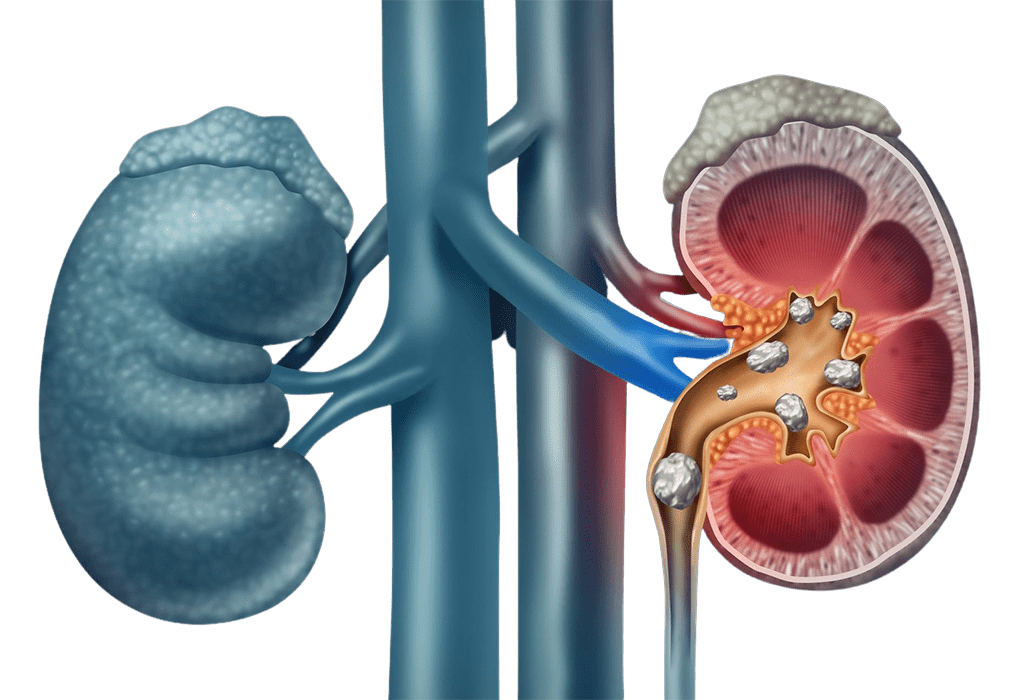
The most common type of kidney stone is created when calcium combines with oxalate in the urine. Inadequate calcium and fluid intake, as well as other conditions, may contribute to their formation.
These stones are rare and tend to run in families.
These stones are less common and are caused by infections in the upper urinary tract.
This is another common type of kidney stone. Foods such as organ meats and shellfish have high concentrations of a natural chemical compound known as purines. High purine intake leads to a higher production of monosodium urate, which, under the right conditions, may form stones in the kidneys. The formation of these types of stones tends to run in families.
Not drinking enough water each day can increase your risk of kidney stones. People who live in warm, dry climates and those who sweat a lot may be at higher risk than others. You need to make enough pee to dilute the things that can turn into stones. If you don’t drink enough or sweat too much, your pee may look dark. It should be pale yellow or clear.
If you’ve had a stone before, you should make about 8 cups of urine a day. So aim to down about 10 cups of water daily, since you lose some fluids through sweat and breathing. Swap a glass of water for a citrus drink. The citrate in lemonade or orange juice can block stones from forming.
If someone in your family has had kidney stones, you’re more likely to develop stones, too. If you’ve already had one or more kidney stones, you’re at increased risk of developing another.
Eating a diet that’s high in protein, sodium (salt) and sugar may increase your risk of some types of kidney stones. This is especially true with a high-sodium diet. Too much salt in your diet increases the amount of calcium your kidneys must filter and significantly increases your risk of kidney stones
High body mass index (BMI), large waist size and weight gain have been linked to an increased risk of kidney stones.
Gastric bypass surgery, inflammatory bowel disease or chronic diarrhoea can cause changes in the digestive process that affect your absorption of calcium and water, increasing the amounts of stone-forming substances in your urine.
Other Medical Conditions such as renal tubular acidosis, cystinuria, hyperparathyroidism and repeated urinary tract infections also can increase your risk of kidney stones.
Certain supplements and medications, such as vitamin C, dietary supplements, laxatives (when used excessively), calcium-based antacids, and certain medications used to treat migraines or depression, can increase your risk of kidney stones.
A major risk factor for kidney stones is constantly low and concentrated urine. The common cause for this is the loss of body fluids from hard exercise, time spent in a hot place, or not drinking enough fluids. When urine volume is low, urine is concentrated and dark in colour.
Concentrated urine means there is less fluid to keep salts dissolved. Drinking more will lower the salts in your urine. By doing this, you may lower your risk of stones forming.
If you’ve had stones, you should drink enough fluid to make at least 2.5 litres of urine every day. On average, this will take about 3-4 litres of fluid intake per day. This will depend on your work environment. While water is the best thing to drink, what matters most is getting enough fluid. The water intake should be in form of a small amount of liquids at regular intervals.
To know the adequacy of the urine production, you should need to go to the bathroom 7-8 times per day and the urine colour should be like water every time.
Certain bowel conditions can raise the risk of forming calcium oxalate kidney stones. For example, conditions that cause diarrhoea (such as Crohn’s Disease or ulcerative colitis) or surgeries (such as gastric bypass surgery done for weight loss) can cause stones. Diarrhoea may result in the loss of large amounts of fluid from the body, lowering urine volume. Your body may also absorb too much oxalate from the intestine. This causes more oxalate in your urine. Both low urine volume and high levels of urine oxalate can form calcium oxalate kidney stones.
A kidney stone usually will not cause symptoms until it moves around within the kidney or passes into one of the ureters. The ureters are the tubes that connect the kidneys and bladder.
If a kidney stone becomes lodged in the ureters, it may block the flow of urine and cause the kidney to swell and the ureter to spasm, which can be very painful. At that point, you may experience these symptoms:
Pain caused by a kidney stone may change — for instance, shifting to a different location or increasing in intensity — as the stone moves through your urinary tract. The kidney stone starts to hurt when it causes irritation or blockage. This builds rapidly to extreme pain. In most cases, kidney stones pass without causing damage-but usually not without causing a lot of pain. Pain relievers may be the only treatment needed for small stones. Other treatment may be needed, especially for those stones that cause lasting symptoms or other complications. In severe cases, however, surgery may be required.
Kidney stones that cause no symptoms, are often found when an X-ray is taken during a health exam.Other people have their stones diagnosed when sudden pain occurs while the stone is passing, and medical attention is needed.If your doctor suspects that you have a kidney stone, you may have diagnostic tests and procedures, such as:
Blood tests may reveal too much calcium or uric acid in your blood. Blood test results help monitor the health of your kidneys and may lead your doctor to check for other medical conditions.
The 24-hour urine collection test may show that you’re excreting too many stone-forming minerals or too few stone-preventing substances. For this test, your doctor may request that you perform two urine collections over two consecutive days
Imaging tests may show kidney stones in your urinary tract. High-speed or dual energy computerized tomography (CT) may reveal even tiny stones. Simple abdominal X-rays are used less frequently because this kind of imaging test can miss small kidney stones.
Ultrasound, a noninvasive test that is quick and easy to perform, is another imaging option to diagnose kidney stones.
Kidney stones are treated based on their size, location, and type of stone. Most small kidney stones won’t require invasive treatment. You may be able to pass a small stone by:
Drinking as much as 2 to 4 litres a day will keep your urine dilute and may prevent stones from forming. Unless your doctor tells you otherwise, drink enough fluid to produce clear or nearly clear urine.
Passing a small stone can cause some discomfort. To relieve mild pain, your doctor may recommend pain relievers.
Your doctor may give you medication to help pass your kidney stone. This type of medication, known as an alpha blocker, relaxes the muscles in your ureter, helping you pass the kidney stone more quickly and with less pain. Examples of alpha-blockers include tamsulosin (Flomax) and the drug combination dutasteride and tamsulosin (Jalyn).
Kidney stones that are too large to pass on their own or cause bleeding, kidney damage or ongoing urinary tract infections may require more-extensive treatment. Procedures may include:
For certain kidney stones depending on size and location — doctor may recommend a procedure called extracorporeal shock wave lithotripsy (ESWL).
ESWL uses sound waves to create strong vibrations (shock waves) that break the stones into tiny pieces that can be passed in your urine. The procedure lasts about 45 to 60 minutes and can cause moderate pain, so you may be under sedation or light anesthesia to make you comfortable.
ESWL can cause blood in the urine, bruising on the back or abdomen, bleeding around the kidney and other adjacent organs, and discomfort as the stone fragments pass through the urinary tract.
A procedure called percutaneous nephrolithotomy involves surgically removing a kidney stone using small telescopes and instruments inserted through a small incision in your back.
You will receive general anaesthesia during the surgery and be in the hospital for one to two days while you recover. Your urologist may choose to do X-rays while you are still in the hospital to confirm stone clearance. You can begin normal activities after about 1 to 2 weeks.
To remove a smaller stone in your ureter or kidney, your doctor may pass a thin lighted tube (ureteroscope) equipped with a camera through your urethra and bladder to your ureter.
Once the stone is located, special tools can snare the stone or break it into pieces that will pass in your urine. Your doctor may then place a small tube (stent) in the ureter to relieve swelling and promote healing. You may need general or local anesthesia during this procedure.
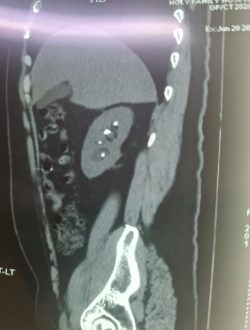
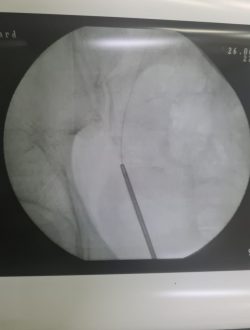
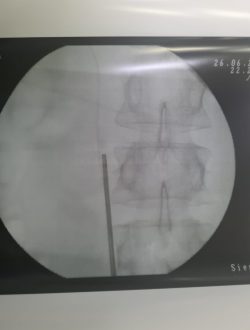
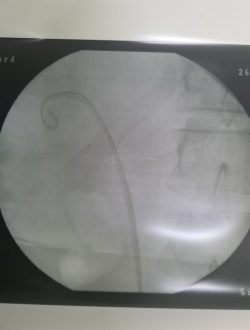
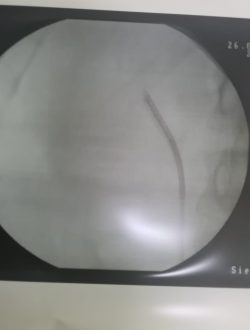
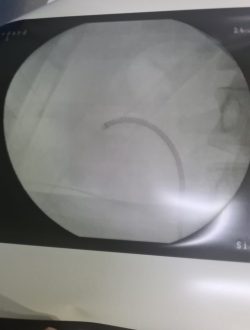
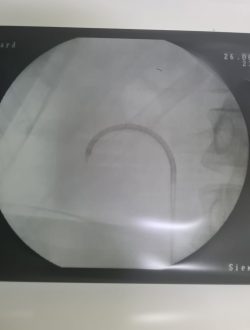
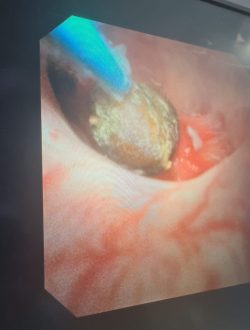
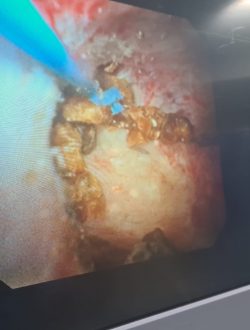
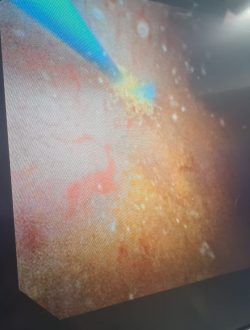
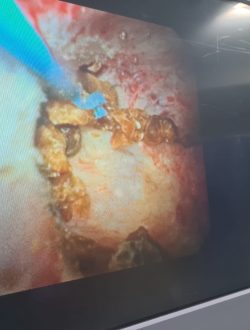
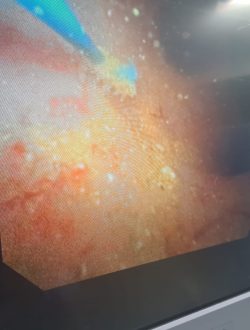
Dr. Utture is Outstanding Doctor who gave good treatment to my 75 years old mother who was suffering from Kidney problem and stomach ache since last 3 years.
Thanks to Dr. Utture
Regards
I have been treated by Dr Anand Utture for multiple kidney stones.He is very knowledgeable, gives right advice, easily approachable and explains in simple language the problem and course of treatment.Takes special care of his patients, truly dedicated doctor
Extremely grateful to Dr Anand Utture for his timely and accurate diagnosis for treating my mother (81 years) for her kidney stones.
very experienced urologist & has done correct diagnosis & treatment of My Grandmother(81 yrs) for kidney stones.











Kidney stones increase the risk of developing chronic kidney disease. If you have had one stone, you are at increased risk of having another stone. Those who have developed one stone are at approximately 50% risk for developing another within 5 to 7 years.
Kidney stones are found in children as young as 5 years. The two most important reasons are not drinking enough fluids and eating foods that are high in salt. Kids should eat less salty potato chips and French fries. There are other salty foods: sandwich meats, canned soups, packaged meals, and even some sports drinks. Sodas and other sweetened beverages can also increase the risk of stones if they contain high fructose corn syrup.
Like the horns of a stag (deer), these stones get their name from the shape they take as they grow to fill the inside of the kidney. Staghorn stones often form because of repeated urinary tract infections (UTIs) with certain kinds of bacteria. Even though they can grow to a large size, you may have no idea you have them because they cause little or no pain. A staghorn stone can lead to poor kidney function, even without blocking the passage of urine. Most often, staghorn-shaped stones are the struvite/infection type of stone.
Kidney stones are more common in people who have a family member with kidney stones. Some conditions that cause stones may be inherited. But sometimes kidney stones form in relatives because of similar diets and lifestyles.
Diet changes recommended tor heart conditions also often help prevent stones. A healthy diet with lots of Fresh fruits and vegetables and less animal protein and salt can help avoid stones and other conditions. You can learn more from your dietician. Keeping a normal weight can also help avoid diabetes and stones.
Yes, kidney stones are serious as if untreated; they can lead to further problems of urinary tract infections and kidney damage. The growth of bacteria can lead to blockage and infection. Also, the presence of kidney stones for long can build up pressure on the kidneys and hamper their functioning.
If a stone in the ureter does not pass in a reasonable time or is causing pain or infection, you will need endoscopic surgery to remove it.
Except for uric acid stones, none of the stones can be dissolved by any form of medicine, let it be homoeopathy, allopathy or Ayurveda. Yes, one can pass a stone naturally when it is small, but for a stone to be able to pass out with the help of water and medicines, it has to be smaller than 6 -8 mm in size. Anything bigger than 8 mm has a less than 10% chance of passing out intact. Stones above 10mm in size should not be given medical treatment at all. It is very important to treat the stone when it is small and complications have not set in. The earlier the patient consults his urologist, the easier, cheaper, faster and less painful it is to remove his or her stone.
Beer does not help in dissolving kidney stones. In fact, beer is known to have excess oxalates and uric acid hence it can accelerate stone growth. There may be some diuretic (more urine production) effect of beer, but other fluids can also achieve this effect.
Dr Anand Utture is a Senior Urologist who is internationally recognized for his surgical expertise and academic contribution to the field of Urology, in particular, the sub-specialised field of Flexible ureteroscopy with Laser which is the latest & most advanced technology with the highest success rate for the treatment of kidney stones in the world
Book AppointmentMake an appointment with your doctor if you have any signs and symptoms that worry you.
Seek immediate medical attention if you experience:

